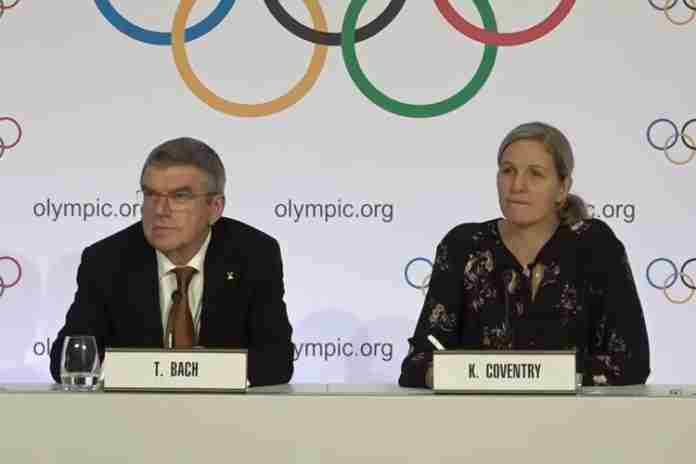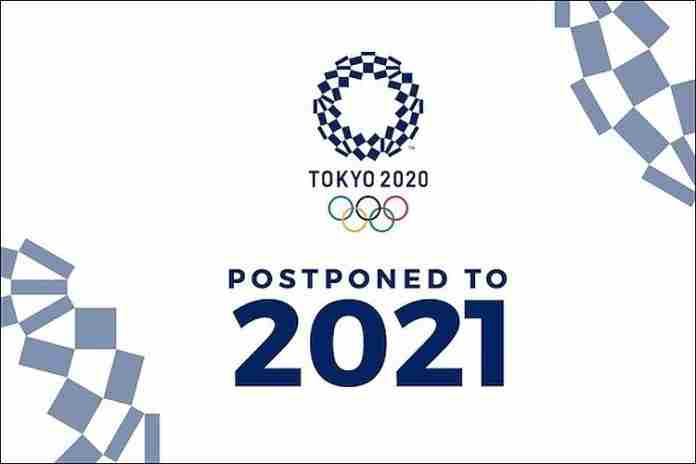The World Health Organization and Africa. Those were the triggers that led the International Olympic Committee to decide, in concert with the Japanese government and the organizing committee, to postpone the 2020 Tokyo Games into 2021.
During a nearly-one hour teleconference on Wednesday morning (25th), IOC President Thomas Bach gave a lengthy, 11-minute recitation of the step-by-step process that led to Tuesday’s landmark agreement to postpone an Olympic Games for the first time.
The key moments of the past week, with Bach’s comments:
● Tuesday: 17 March 2020 ~ Reported COVID-19 cases worldwide = 180,159
The IOC issues a statement noting the situation is changing “day by day” and with more than four months to go, “there is no need for drastic actions at this stage.”
● Wednesday: 18 March 2020 ~ Reported COVID-10 cases worldwide = 194,909
The IOC holds teleconferences with the National Olympic Committees, International Federations and with 220 athlete representatives about the situation. Said IOC Athletes’ Commission chair Kirsty Coventry (ZIM), “I think the goal is definitely to get to the 24th July and the Tokyo Olympic Games but we also have to be realistic and not panic at this stage and know that this landscape is changing hourly and daily for everyone around the world and we share the concerns.”
● Friday: 20 March 2020 ~ Reported COVID-19 cases worldwide = 242,473
National Olympic Committee officials in Brazil, Great Britain and Norway ask for the Games to be postponed. USA Swimming and USA Track & Field ask the U.S. Olympic & Paralympic Committee to ask the IOC for a postponement.
● Sunday: 22 March 2020 ~ Reported COVID-19 cases worldwide = 305,275
The IOC Executive Board announced changes in its planning for the Games, including “changes to the start date of the Games.” Bach posts an open letter to athletes, noting that “we are relying on the advice of a Task Force including the World Health Organization” and that a decision on possible postponement will be taken within the next four weeks.
National Olympic Committees in Canada and Australia posted statements that they would not participate in a 2020 Games held in July.
Said Bach in the teleconference:
“We had at the very beginning of this crisis, a clear focus on the development in Japan, where we had always to evaluate whether Japan would be in a position to offer a safe environment for every participant of the Olympic Games.
“This focus then shifted, more and more, to the international world, because we could see on the one hand, the progress being made in Japan fighting the virus, and the efficiency of the measures being taken. But we could, and had to see on the other side, that the virus was spreading so rapidly that it became, more and more, a question whether the world could travel to Japan and whether Japan there, could afford, in the spirit of containing the virus, to really invite the world.
“This situation we had to address. Japan was very confident to go ahead, and then we saw there, last Sunday, in the morning, we saw the figures from Africa – in particular – where we are, obviously at the beginning of an outbreak. Still a low number, but many countries being affected; this is how it started everywhere. We saw there the dynamic development in South America, and in U.S. and in other countries, and this was the moment when we saw this, on Sunday morning, I called an emergency meeting of the IOC Executive Board, with the aim to open a discussion with our Japanese hosts and partners and friends, to start opening a discussion about the postponement of the Games.
“Because we could not, you know, manage such a postponement without the organizing committee, without the full support of Japan. Before this Executive Board meeting, I called President Mori from the organizing committee, who had then taken contact also with Prime Minister Abe. There, the result of this conversation was, that the organizing committee in Japan, is ready to enter into a discussion about the different scenarios, in particular about postponement, after having heard and being confirmed by our commitment that a cancellation would not be one of the scenarios to be considered.
“We then had the Executive Board meeting, on Sunday afternoon, our European time, with the result you know, opening up there the door to study there, also, postponement. Hours after this Executive Board meeting, new, alarming informations were coming in. We saw there, more and more travel restrictions there coming up. During the Executive Board we heard that the virus starts to spread on a number of islands in Oceania.”
● Monday, 23 March 2020 ~ Reported COVID-19 cases worldwide = 338,303
The U.S. Olympic and Paralympic Committee released a survey of 1,780 athletes, with 68% stating the Games could not be held fairly if begun in July. Some 64% said the local coronavirus restrictions had either severely impacted their ability to train, or kept them from training altogether. Based on this, the USOPC asked the IOC to postpone the Games.
A poll of track & field athletes by The Athletics Association reported 4,036 responses, of which 78% preferred postponement of the Games.
In Lausanne, the wheels were already turning. Said Bach:
“The next morning, Monday morning, then we received a declaration from the World Health Organization which was pretty alarming, where the Director General said that the spreading is accelerating and that the Director General of the World Health Organization wants to have an emergency call with the G-20 leaders to address this situation.
“This, then, led us to contact the organizing committee again and to advise them that in the phone call being scheduled for the next day, for Tuesday – yesterday – between Prime Minister Abe and me, that we, in the light of this developments after the Executive Board meeting, we would like to propose to take a decision on the postponement of the Games, already in this phone call.”
Abe told reporters in Tokyo that it was not possible to hold the Games as planned, saying “It’s important that not only our country but also all the other participating countries can
take part in the Games fully prepared.”
● Tuesday, 24 March 2020 ~ Reported COVID-19 cases worldwide = 378,040
Said Bach:
“And then we had this phone call and as a result of this phone call, where then Prime Minister Abe himself, after his introductory remark, suggested there a postponement as the decision of the IOC. Then after consultation in this phone call, we came to the conclusion that this must be a decision, cannot be a unilateral decision of the IOC, but must be a joint decision because in order to organize there successful Games, we need to be in full agreement and need to be united.”
Later on Tuesday, a joint statement between the IOC and the Tokyo organizers explained “In the present circumstances and based on the information provided by the WHO today, the IOC President and the Prime Minister of Japan have concluded that the Games of the XXXII Olympiad in Tokyo must be rescheduled to a date beyond 2020 but not later than summer 2021, to safeguard the health of the athletes, everybody involved in the Olympic Games and the international community.”
● Wednesday, 25 March 2020 ~ Reported COVID-19 cases worldwide = 416,916
Bach was asked if he had any regrets on the way the crisis had been handled, especially in view of the criticism over how long it took to announce a postponement:
“No, because this was the commitment and is the commitment to our Japanese partners. I think I at least tried to explain that the focus was shifting. What we expressed was the confidence in our Japanese partners and friends to organize there, in July, in safe conditions, Olympic Games. And to this, we were committed, and to this, we are committed there also for the postponed Games.
“[What] then made the change was, there, the dynamic changes in the worldwide health situation and there, for a postponement – because again, a cancellation we could have decided in our own – but for a postponement, we need of course there the full commitment of our Japanese partners, also for the postponed Games. And this is what we were looking for there with our approach, and this is what we then yesterday [Tuesday] have achieved, in this way, making it possible that the Olympic Games Tokyo 2020 are happening, have not to be cancelled, but can give the athletes, you know, the hope, and now also the athletes to be assured that their Olympic dream can come true, even with a delay.”
Bach was asked a half-dozen times whether, essentially, he and the IOC were wrong in the way they handled the situation, especially in how long it took to announce the postponement. He brushed each question aside easily, and had this snappy comeback for a question from Tarik Panja of The New York Times:
“[D]on’t forget that, in this time, during the last couple of weeks, the measures of many governments, you know, they were limited until mid-of-April, some beginning of May and, you know, we could not see measures having been taken lasting until July and you have maybe seen the latest declarations there in United States from President Trump about the prospect of mid-of-April there, being able to lift many restrictions.
“And so, there, we were in line with these developments and we were, again, there in line with the advice of the World Health Organization, and the moment they changed, then also their advice with this statement of the Director General on Monday and even before, you know, when we saw the day before, Africa, because there I must say, from the very beginning, this was a big worry for me personally also, but for all of us that if the virus, you know, would outbreak there in Africa, on this huge continent, with the challenges many countries in Africa have to face already now, that this would be then a very dramatic development, which will not only affect Africa but will again affect then the entire world.
“And this is why, you know, this was such a crucial moment and again, then, the advice by the World Health Organization of the declaration by the World Health Organization there, the day before yesterday.”
Bach was also asked if the “voices of the athletes” were taken into account:
“The athlete’s voice we have always taken into consideration and playing a very important role. We are in constant contact there, with our Athletes’ Commission; the chair of the Athletes’ Commission being a member of the IOC Executive Board, taking part in any consultation, in any decision, in any vote.
“I also had addressed a letter to the athletes, already a couple of weeks ago. There were calls between our Athletes’ Commission and many athlete’s representatives there, around the world, and then finally, in all this consultations last week, we had telephone conferences with all the National Olympic Committees, with all the International Federations and at the end of this conference, a one-by-one vote for each NOC and for each International Federation, whether they agree with the strategy there proposed by the IOC Executive Board. And we had there, in this one-by-one vote, unanimous support, including from the Canadian Olympic Committee.”
Asked about the impact of Canada’s statement last Sunday that it would not attend the Games if held in July, Bach replied:
“It is the right of every athlete to decide, if qualified, if he or she wants to participate in the Olympic Games. I do not think that such a decision can be taken by a majority vote by anybody. There we have to respect the rights of the athletes, and if an athlete decides not to go to the Games, this is his good right.”
In light of this answer, it would have been instructive if the Games would have been green-lighted for July and a Canadian athlete wanted to attend the Games … as a refugee from his or her own National Olympic Committee!
But the postponement is on and the myriad details are being worked out. The IOC declared a postponement in concert with the Tokyo organizers and the Japanese government 13 days after the World Health Organization declared a pandemic and two days after the WHO announced that the spread of the virus was accelerating. And, frankly, if a successful Games is held next year, almost no one will remember these details.
Rich Perelman
Editor
You can receive our exclusive TSX Report by e-mail by clicking here. You can also refer a friend by clicking here.




























